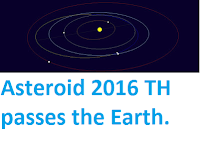Asteroid
2016 UQ36 passed by the Earth at a distance of 396 900 km (1.03 times the
average distance between the Earth and the Moon, 0.27% of the average distance
between the Earth and the Sun), at about 10.20 pm GMT on Monday 24
October 2016. It has not been possible to determine the size of this object, though given the closeness at which it passed the Earth, this inability implies it must be fairly small.
The calculated orbit of 2016 UQ36. Minor Planet Center.
2016 UQ36 was discovered on 26
October 2016 (two days after its closest approach to the Earth) by the
University of Arizona's Mt. Lemmon Survey at the Steward Observatory on Mount
Lemmon in the Catalina Mountains north of Tucson. The designation 2016 UQ36
implies that the asteroid was the 916th object (object Q36) discovered in the second half of October 2016 (period 2016 U).
2016 UQ36 is calculated to have a 851 day orbital
period and an elliptical orbit tilted at an angle of 4.70° to the plain of the
Solar System that takes it from 0.88 AU from the Sun (i.e. 88% of the average
distance at which the Earth orbits the Sun) to 2.66 AU from the Sun (i.e. 266%
of the average distance at which the Earth orbits the Sun, almost twice the
distance at which the planet Mars orbits the Sun). It is therefore classed as
an Apollo Group Asteroid (an asteroid that is on average further from the Sun
than the Earth, but which does get closer).
See also...
Follow Sciency Thoughts on Facebook.







